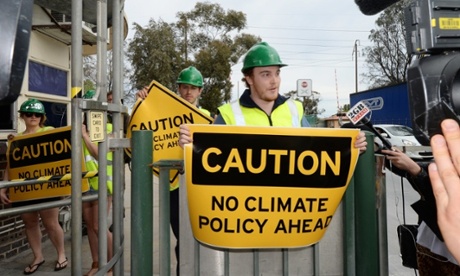by Robert Manne, The Guardian, July 15, 2014

The argument for radical action on climate change– which Australia will soon at least temporarily reject with the shameful decision to repeal the carbon tax – is embarrassingly simple.
For the past 200 years, western culture has granted science pre-eminent cultural authority. A quarter century ago, a consensus formed among contemporary scientists specialising in the study of the climate. The consensus comprised one principal idea: the primary source of energy on which industrial civilisation relied – the burning of fossil fuels – was dangerously increasing the temperature of the earth.
Thousands upon thousands of scientific studies have been conducted estimating the impact of this warming. Hundreds of outstanding books have been published making the conclusions of the scientists available to the general public. To anyone willing to listen, these scientists have explained that unless human beings derive their energy from sources other than fossil fuels, the future that we face over the next decades and centuries involves the rendering of large parts of the earth uninhabitable to humans and other species – through the melting of the ice caps and glaciers and thus steadily rising sea levels, the acidification of the oceans, the destruction of forests and coral reefs, and the increase in the prevalence and intensity of famines, insect-borne diseases, droughts, bush fires, floods, hurricanes and heat-waves.
Climate scientists also explained that radical action on climate change could not be delayed. The carbon dioxide being emitted by human activity would remain in the atmosphere for a century or longer. The damage our generation was inflicting on the earth and its inhabitants was irreversible and therefore terminal. In human history, the scientists warned, there had been so far been no catastrophe even remotely as serious or as grave as the one we were about to face if we failed to take timely action against impending climate change.
So far, the warnings issued by the climate scientists have gone largely unheeded. In 1997 the international community that gathered at Kyoto produced a desperately inadequate agreement to curb greenhouse gas emissions. In every year following Kyoto, emissions steadily rose. The international community re-assembled at Copenhagen in 2009. Virtually nothing of significance was agreed. Emissions continued to rise. The modest reductions that have been achieved in recent years among the advanced industrial economies – either through market mechanisms, or the economic downturn following the global financial crisis, or the temporary movement in the US from coal to natural gas – have been more than cancelled out by very rapid increases in emissions produced in the emerging economies like China and India now seeking their own place in the industrial sun.

As global emissions increased, something surpassingly strange occurred in the realm of politics in the US – something without parallel in the history of the post-Enlightenment west since the Darwinian controversy. The emergence of a broad-based movement of thought challenging the sovereignty of science in one specialised field.
Anti-science climate change denialism began with money cynically and strategically supplied by the massive American fossil fuel corporations. From there it spread to the powerful US network of neo-liberal "think-tanks" whose purpose was to produce the ideas helping to make the world safe for the wealthiest members of the society – the so-called 1%. And from the think-tanks climate change denialism steadily spread downwards to American society more generally, thanks to rabid right wing media like Fox News, until it was powerful enough to capture, almost in its entirety, one of America’s traditional political parties, the Republicans.
As a consequence of the spread of climate change denialism, tens of millions of American citizens now base their opinions on the kind of pseudo-knowledge manufactured by the climate change denialist blogs and disseminated daily by the right-wing media. They have come to treat the questions of whether the earth is warming, and if so why, as political matters concerning which those without any genuine scientific understanding or training are as qualified to form an opinion as professors who have devoted their lives to one of the disciplines of climate science.
Climate change denialism soon spread beyond the US, especially to the countries of the English-speaking world. As Australia is a country extremely sensitive to the cultural winds blowing in from the US, reliant on the export and consumption of coal, and where the denialist Murdoch newspapers exercise enormous unhealthy influence, it is hardly surprising that over the past decade climate change denialism quickly sunk deep roots here.
The impact was seen in late 2009 with the coup inside the Liberal party which replaced Malcolm Turnbull, a rational believer in climate science, by a complacent opportunist, Tony Abbott, who regarded and still regards climate science as "crap." The anti-Turnbull coup represents the most critical moment in the recent history of Australia. Abbott was elected by the right-wing of his party for a single purpose: to destroy any meaningful action in Australia against the threat of climate change. When the carbon tax is repealed, the leaders of the coup and the fossil fuel interests they represent will receive from a dutiful prime minister their anticipated reward.
The right-wing denialists, now dominant within the Coalition, often call themselves conservatives. They are not. At the heart of true conservatism is the belief that each new generation forms the vital bridge between past and future, and is charged with the responsibility of passing the earth and its cultural treasures to their children and grandchildren in sound order. History will condemn the climate change denialists, here and elsewhere, for their contribution to the coming catastrophe that their cupidity, their arrogance, their myopia and their selfishness have bequeathed to the young and the generations still unborn.







No comments:
Post a Comment